This document summarises the efforts undertaken by Kennisland, Centrum Cyfrowe[1] and Commons Network to develop a new vision for digital policymaking in Europe[2]. To this end, we have created a new policy frame[3], in an effort to find solutions for a number of problems that plague the Internet. Over the past five months we have worked on developing a frame that can replace the existing Digital Single Market frame of the European Commission. A new frame can guide policymakers and civil society organisations involved with digital policymaking in the direction of a more equitable and democratic digital environment, where basic liberties and rights are protected, where strong public institutions function in the public interest, and where people have a say in how their digital environment functions - a Shared Digital Europe.
The core of this frame was developed during a stakeholder workshop in October 2018 that brought together approximately twenty civil society experts[4], representing a broad range of perspectives and stakes from across the European Union. We have developed this frame in the context of the upcoming elections of the European Parliament.
The opportunity
Over the course of 2018, we conducted an analysis of the impact of the current framing of the Digital Single Market in Europe[5]. We observed that discussing digital policy questions within this framework reduces broad policy issues to questions about the proper functioning of markets. It also isolates policymaking in the digital space from the existing traditions of policymaking for offline public spaces in the area of culture, education or civil infrastructure in general.
Seeing the digital space only as a marketplace is short sighted and unrepresentative of its effect on our lives. The digital space is in effect our society – a society that is experiencing a digital transformation. Therefore we cannot accept to define the digital sphere as a place where only market dynamics rule.
When we think of digital we should not think of technology as an end in itself or a rigid force with a predetermined direction. We should think about society becoming digital. What do we want that society to look like? And what shape should technology take to facilitate this change? Similarly, we should not think of a digital transition as a simple process of modernisation tied to technical efficiency. Digital changes the society, and we need to shape and design technology based on positive social objectives. Digital technologies should facilitate a society that is equitable and democratic, where basic liberties and rights are protected, where strong public institutions function in the public interest, and where people have a say in how things work. We believe that Europe has the capacity to shape such a digital society.
The digital policy space as it exists today displays a number of issues that are perceived as problematic by policymakers across the political spectrum, and a wide range of civil society organisations. These challenges include (but are not limited to):
- A lack of control of (personal) data, and the absence of privacy as a result of a digital space increasingly governed by a handful of platform providers.
- The misguided perception that the digital space is only a marketplace, marginalising the role of public institutions and other non-market actors.
- The monopolisation of the Internet by large and primarily non-EU corporations, leading to loss of sovereign oversight of our digital space and economy.
- The deterioration of online public debate due to the increase of misinformation and the reinforcement of filter bubbles.
- A lack of democratic oversight over the digital space, leading to mistrust in the democratic process overall.
- A lack of EU-based digital development and service delivery, leading to a loss of innovation and opportunities for social and economic development in line with European values.
These problems exist in the digital space, but are caused or exacerbated by broader trends in the society. Importantly, these challenges will in turn be amplified on that wider society and the functioning of European democracies. Therefore, any solution to the problems in the digital space will need to take into account these societal dynamics in Europe in order to have a positive impact on European democracies as well.
Reframing digital Europe
Our analysis is elaborated in a number of background papers and blog posts. We conclude that without a different view on the digital space so that it also includes social, public, cultural and other values, a number of these current and expected problems will be impossible to resolve. This means that Europe needs a new vision for its digital society. Our reliance on platforms and services that have grown to dominance by appropriating the data produced by our daily lives has come to a point where its detrimental effects clearly outweigh the value provided by these services to citizens and Europe as a whole. We need an effort to reclaim our digital sovereignty to create a Shared Digital Europe that embraces our democratic values and strives for equity and social justice. We need an understanding of the digital space that takes into account that it is a hybrid space, both a market as well as a public space where the commons can also thrive.
Through consultation with stakeholders, including several workshops, we collectively identified four principles that we see as foundations for a new project to build a shared, European digital space that is not just market-focused. Policies framed on the basis of these principles ensure that the balance between private and public interests is safeguarded. These principles for a Shared Digital Europe are interconnected yet distinct, and form a consistent proposal for a new framework for thinking about the digital space in Europe. They are: Enable Self-Determination, Cultivate the Commons, Decentralise Infrastructure and Empower Public Institutions. They apply to all layers of the digital space from the physical networking infrastructure to the applications and services running running on top of the infrastructure and networking stack. Likewise they apply to the social, economic or political aspects of society undergoing digital transformation. The four principles are summarised in the diagram below.
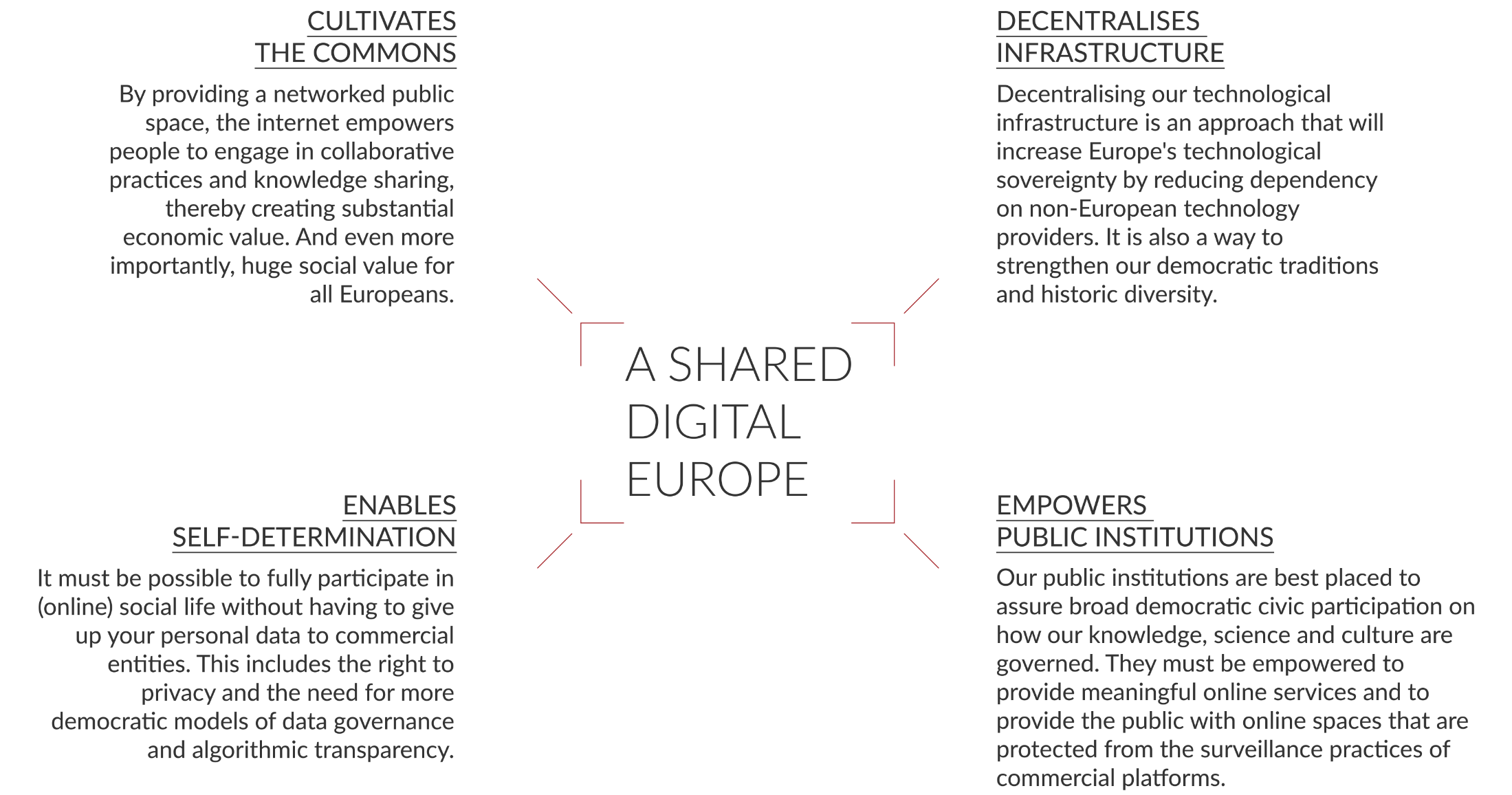
A new narrative
It appears that most of the policy makers and other stakeholders across the political spectrum agree on two connected issues:
- Europe needs to be able to shape the digital space for its citizens, communities, innovative businesses and policymakers.
- The unique identity of Europe as a collection of diverse communities - bound by democratic values, bottom-up self-governance, individual freedom and social rights - needs to be reflected in that digital space.
In proposing our new frame we are making use of dissatisfaction with the current way the digital space is organised to form a coalition for an alternative vision. While it may be difficult to coalesce around a common frame with these different actors, rejecting the current one and agreeing on a number of common principles will open up the opportunity for significant change. And at a minimum, the need to create a new kind of shared public space in Europe through digital technologies is a common objective across a broad section of the political spectrum. This includes such basic issues as ensuring that (social) innovation remains possible for European businesses and civil society, and protecting the fundamental rights of Europeans online.
In the diagram below, we have summarised key elements of the proposed frame and how it expands on the the current Digital Single Market frame.

The time is clearly right to establish a new frame for digital policymaking, one that breaks with the market focus of the Digital Single Market.. In fact, several efforts are underway to search for such a frame.
First, there is growing awareness of "tech ethics" within the business community, especially in relation to the development of artificial intelligence technologies. This value-based approach is visible for example in the EU's "Strategy for AI in Europe" and could be applied to other issues and technologies.
Second, a growing number of actors is talking about a “human-centric” or “user-centric” approach. These terms are being used both by civil society actors (such as OSEPI and BEUC) and by businesses - in 2018, the Spanish telecom company Telefonica has launched its "Digital manifesto for human-centric digitalisation"[6]. This concept, which has been well-developed in reference to user-experience design, is now being extended to encompass digital policy design.
Third, many civil society organisations have been working within a policy frame based on the idea of digital human rights, and focusing their efforts on the protection of these rights through appropriate regulation. Europe's GDPR regulation can be seen as developed within this frame.
We agree with the general vision of "human-centric digital policy", especially as a break from the market-centric dogma of the last decade. Yet the term "human-centric" on its own is insufficient to secure policies that are beneficial for users of digital technologies.
Furthermore, a "digital-human-rights" or "human-centric" approach focuses on individuals and individual rights in the design and governance of the Internet. A "tech-ethics" approach additionally works with a simplistic model of technology regulation that puts faith in individual decision-making and power to control technologies.
Individual users cannot and should not be burdened with governing a part of society which is as enormous and complex as the digital space. What if we would say we are going to design a human-centric economy, or human-centric finance? That would again put the onus for making these parts of society better on individuals rather than on society as a whole.
We consider this individualistic approach as too weak to facilitate a fundamental change in how digital policymaking is approached. We therefore prefer the term “society-centric”, to define digital regulation that by design pays attention to the social dimensions and consequences of technological development.
To this end, we have developed our four principles in which the human-centric approach can be made more precise and meaningful. With our frame, we put greater focus on collective rights and the collective dimension of regulating technologies, seen as a complex ecosystem. We thus propose a way forward which balances individual rights and the collective.
Towards a Shared Digital Europe
From our analysis of the problem, the policy landscape in which these questions are debated, combined with the work already being done by numerous CSOs, it becomes clear that there is a way forward. Yet the lack of alignment of visions and goals hinders civil society's ability to create an alternative to the dominant market-focused frame.
A new frame should bring a wide coalition of CSOs together to work towards a common aim through different means This could offer policymakers a fresh take on a problem many of them are stuck with, and it could offer a way to introduce the many solutions that have already been developed, including our own four principles for the architecture of the digital space.
Such a frame would need to incorporate a number of different principles to be broadly relevant yet coherent. These include:
- An acknowledgement that the digital space is not exclusively, or even primarily, driven by market forces;
- That Europe instead needs a digital space which serves its public by allowing culture, innovation, privacy and civic debate to flourish;
This means that it needs to build on the core values that distinguish Europe and make it resilient and competitive in a global economy, including:
- strong public institutions to protect the digital space and people’s digital lives;
- democratic governance and control of these public institutions to ensure individual and community sovereignty;
- cultural diversity and space for creativity and initiative to maintain and strengthen Europe’s innovative edge;
- human rights and social justice ensuring that all Europeans have the actual opportunity to enjoy the digital space equally.
All of the above needs to be understood in the context of an effort to promote a regenerative economy based on circular principles and with the aim to maintain a sustainable system for people and the planet. By supporting the emergence of technological solutions that champion these values, Europe can foster growth of a technology sector that offers services and products that are distinct from the offerings of other global players. A society-centric approach can be a source of innovation and competitive advantage for Europe.
To achieve this, we should aim for a digital space that is truly European, which contributes to making Europe stronger, more democratic and sustainable, and which offers a shared experience for Europeans in all their diversity. In proposing a Shared Digital Europe as a new overarching frame for the digital policymaking in Europe we try to bring together some of these concerns to form a broad support base for an alternative to the Digital Single Market frame.
A new vision for a Shared Digital Europe
For the last 10 years, we have focused on regulating the digital space towards building a Digital Single Market in Europe. This approach does not suffice to address challenges that are ahead of us.
Europe needs to establish its own digital space that embodies our values: strong public institutions, democratic governance, sovereignty of communities and people, diversity of European cultures, and equality and justice. A space that is common to all of us, but at the same time diverse and decentralised.
Today, market orthodoxy limits our ability to deal with the domination by corporate monopolies that constrain both individual freedom online and the emergence of a truly European civic space. This market focus needs to be replaced with an approach that is society-centric at its heart.
A new project to build a Shared Digital Europe will be our source of strength, by supporting social and economic innovation, as well as new, regenerative modes of production.
A Shared Digital Europe is a vision of a digital space that facilitates diversity, empowers communities and favours an overall people-centric and public-interest approach to technology development and innovation.
How to get there?
Having identified this frame we will now need to start inserting it into policy discussions. Initially this means going back to key players from CSOs and aligned policymakers and discuss with them how framing digital policies as an attempt to create a Shared Digital Europe contributes to their objectives.
In a next step we will need to work with other stakeholders to translate the four principles for a Shared Digital Europe into concrete policy proposals and agendas. These principles should serve as high-level objectives guiding the development of new policy proposals. They should also be used for evaluating existing and proposed policies. We believe that the frame is broad enough to accommodate a wide range of progressive voices advocating for better digital policies.
In this project we did not only come up with an overarching frame to shape the debate, but we also provide four broad solutions that point the direction for potential policy interventions. The four principles for a Shared Digital Europe are shared by our peers - and emerged through a collaborative creation process. This comprehensive approach and narrative gives us the opportunity to present a full-scale agenda and push ahead in a time when there will be a certain vacuum with regard to digital policymaking and a clear need for vision and new ideas.
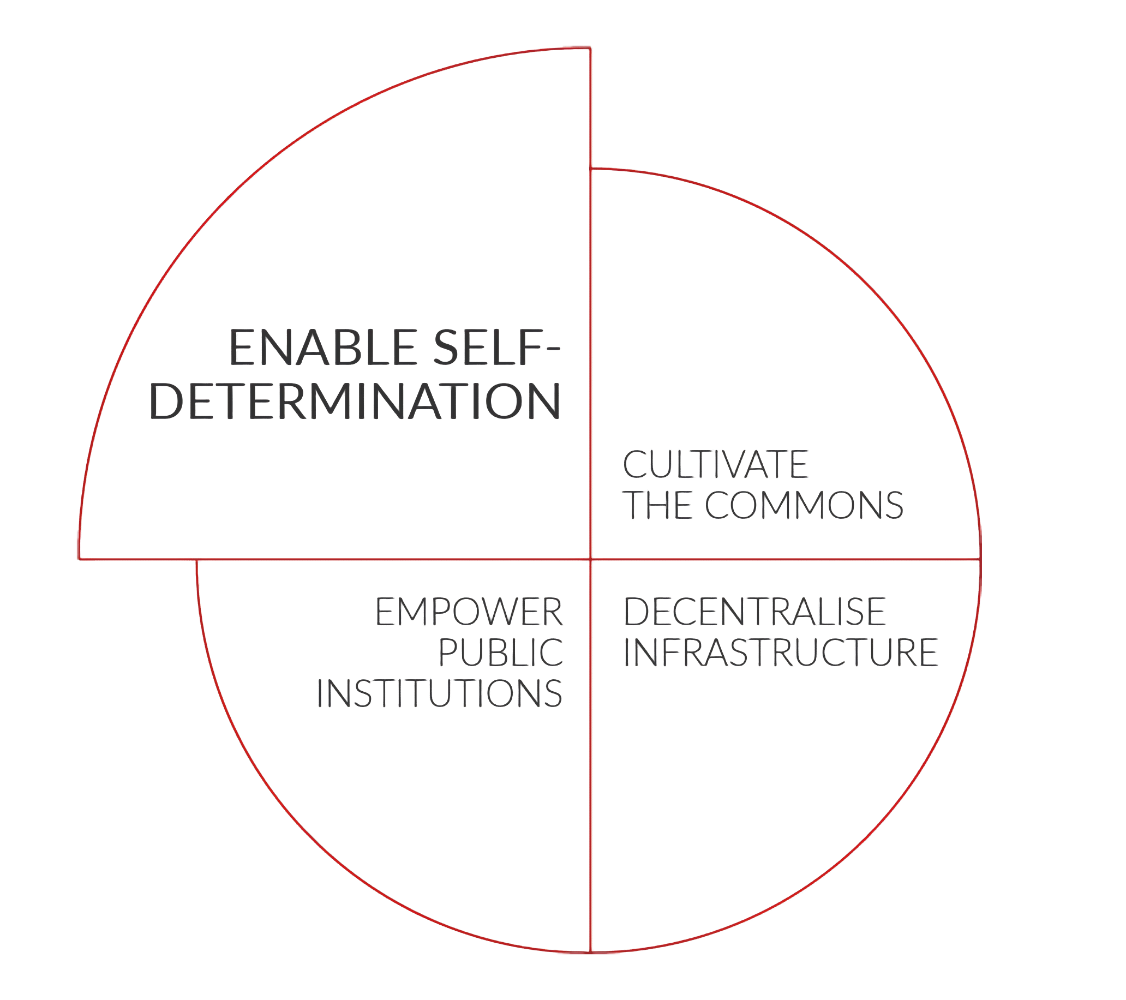
A Shared Digital Europe enables self-determination — It must be possible to fully participate in (online) social life without having to give up your personal data to commercial entities. This includes the right to privacy and the need for more democratic models of data governance and algorithmic transparency (read more).
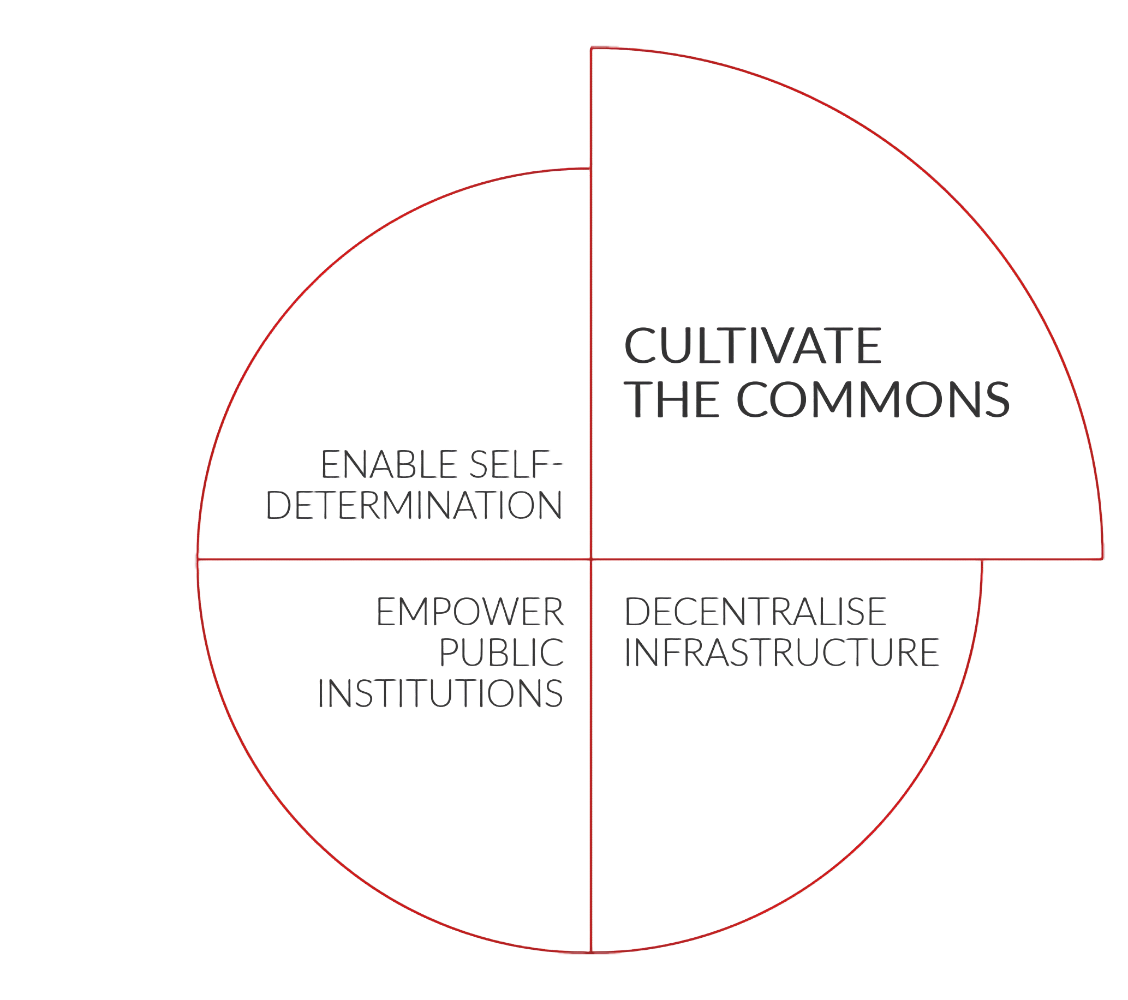
A Shared Digital Europe cultuvates the commons — By providing a networked public space, the Internet empowers people to engage in collaborative practices and knowledge sharing, thereby creating substantial economic value. And even more important, huge social value for all Europeans (read more).
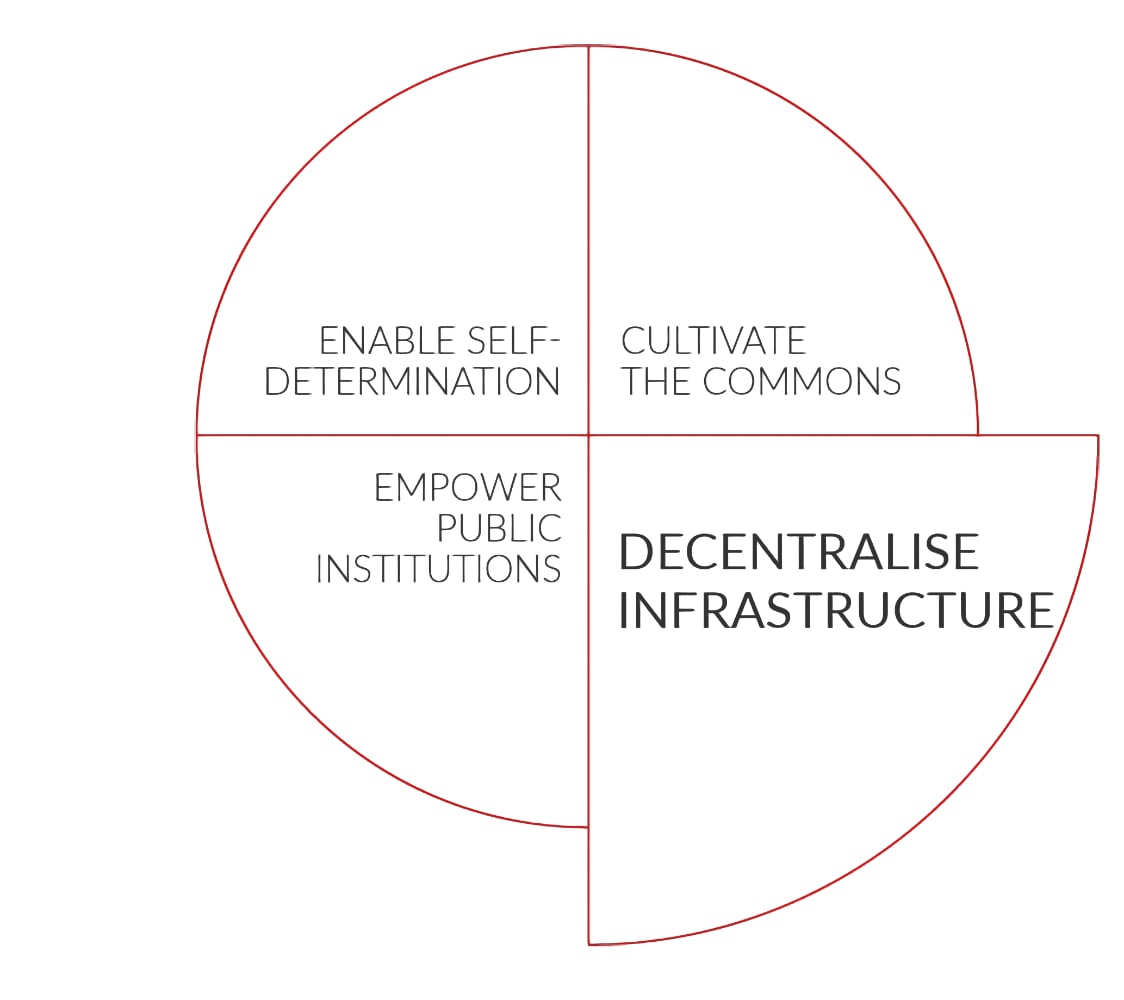
A Shared Digital Europe decentralizes infrastructure — Decentralising our technological infrastructure is an approach that will increase Europe's technological sovereignty by reducing dependency on non-European technology providers. It is also a way to strengthen our democratic traditions and historic diversity (read more).
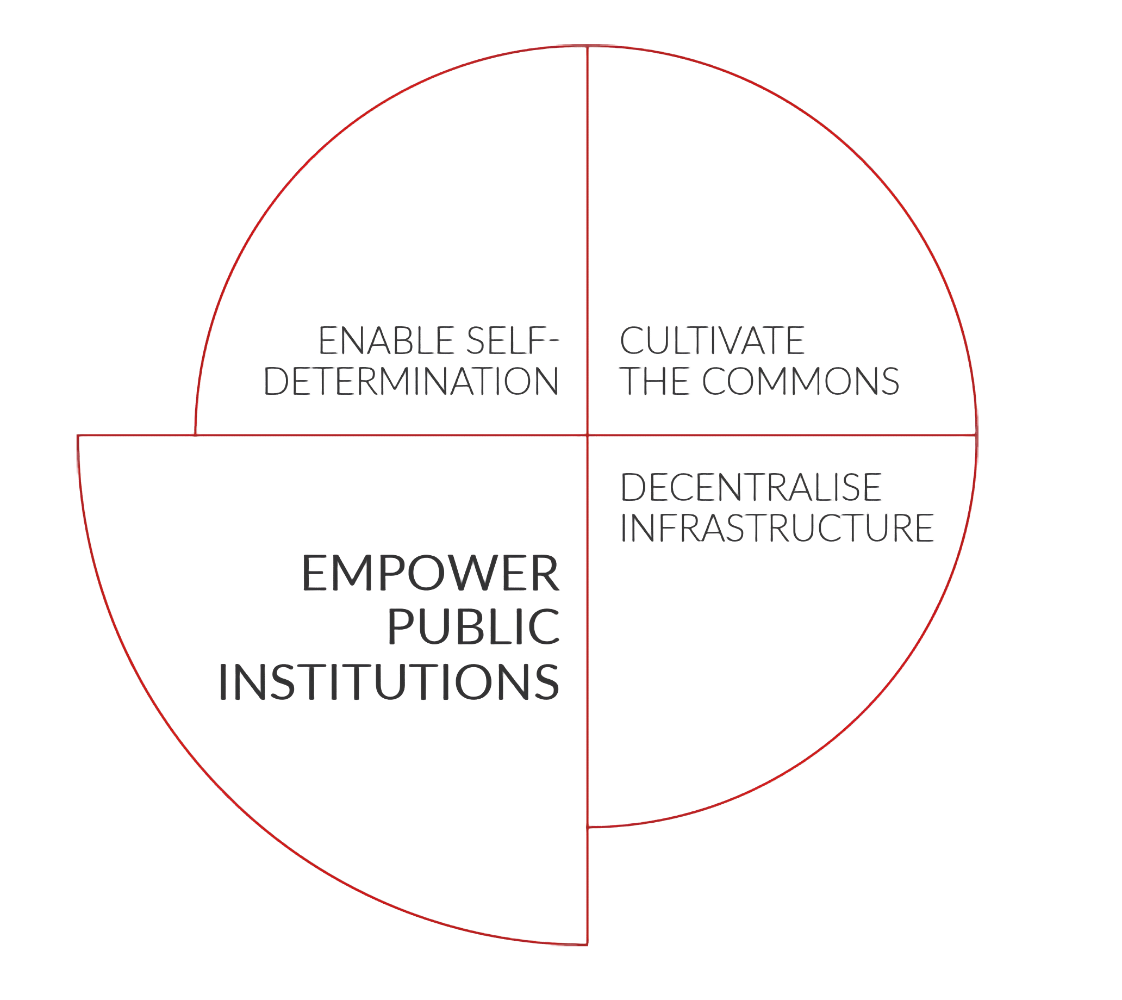
A Shared Digital Europe empowers public institutions — Our public institutions are best placed to assure broad democratic civic participation on how our knowledge, science and culture are governed. They must be empowered to provide meaningful online services and to provide the public with online spaces that are protected from the surveillance practices of commercial platforms (read more).
Any effort to bring this Shared Digital Europe to life will rely on these four core principles that underpin it. In the next phase we will further develop these into concrete policy objectives that illustrate the Shared Digital Europe approach.
The two authors associated with Centrum Cyfrowe and Kennisland have since left these organisations and continue their work towards the vision expressed here as part of Open Future. ↩︎
This document is also available as a pdf file and on GitHub. ↩︎
With policy frame we are referring to a set of narratives, principles and values that define a policy space, and as a result determines which policy interventions are valid and which ones are not (or less) valid. The policy frame provides guidance and general goals for a shared process of change. ↩︎
You can find an overview of everyone who has contributed to shaping this vision on the about page ↩︎
For more background see our analysis of how the existing Digital Single Market framing was introduced into the EU policy discourse. ↩︎
More details on these examples of user-centric / human-centric framing here. ↩︎
